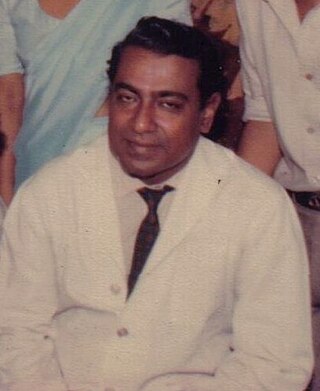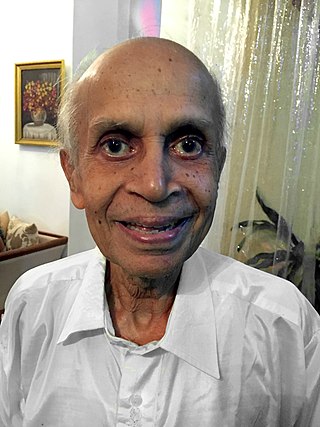
The University of Moratuwa is a public university in Sri Lanka. It is located on the bank of the Bolgoda Lake in Katubedda, Moratuwa, a suburb of Sri Lanka's capital Colombo.

Established in 1870 as the Colombo Medical School, the Faculty of Medicine of the University of Colombo, is the second oldest medical school in South Asia. It is considered to be the top most medical faculty in the country which requires the highest entry qualification in GCE Advanced Level examination.

Devaka Fernando is a Sri Lankan physician and academic. He was president of the Osteoporosis Society of Sri Lanka and the Founding Professor of Medicine at the University of Sri Jayawardanapura.

Deshamanya Surendra Ramachandran, FRCP was a Sri Lankan Physician and Nephrologist. He was the founder of Sri Lankas First Dialysis Unit.
H. H. R. Samarasinghe, FRCP, FRACP is a Sri Lankan physician, medical administrator and president of the Sri Lanka Medical Council.
Mohamed Hussain Rezvi Sheriff, FRCP (Lon), FRCPE (Edin), FRACP, FCCP, FSLCGP, FNASSL is a Sri Lankan academic, nephrologist and physician. He served as the director of the Postgraduate Institute of Medicine; senior professor of medicine; head of the Department of Clinical Medicine at the Faculty of Medicine, University of Colombo. He is currently serving as the Senior Professor of Medicine at General Sir John Kotelawala Defence University. He is also a consultant physician and nephrologist at National Hospital of Sri Lanka. He is also the founder and owner of Western Hospital.
Janaka de SilvaFRCPFNASSL is a Sri Lankan physician and academic. He is Professor Emeritus of Medicine at the University of Kelaniya.
Ravindra Fernando is a Sri Lankan forensic pathologist, toxicologist, physician, author and academic. He is the current chairman of the National Dangerous Drugs Control Board of Sri Lanka.
Cyril Francis Fernando was a Sri Lankan clinician and researcher.

Upendra Srinath Jayawickrama (FRCP), is a Sri Lankan physician (endocrinologist) and an artist. He was the founder of the Diabetes Association of Sri Lanka and a professor of pharmacology at the North Colombo Medical College.

Dr Bothalage Desmond James Stanley Fernando (1930–2012) was a Sri Lankan doctor and inventor, best known for his services to General Practice in the country.
Jayatissa Nalin Rodrigo was a Sri Lankan Obstetrician and Gynaecologist, Surgeon, Medical Teacher and Medical Administrator.,
Dr Warusahennadige David Lionel Fernando was a Forensic pathologist and Judicial Medical Officer (JMO) for Colombo.
The Sri Lanka Medical Association (SLMA) is the professional association for doctors and surgical professionals in Sri Lanka. It is considered to be the oldest national professional organisation of medical professionals in Australasia. The association does not regulate or certify doctors, a responsibility which lies with the Sri Lanka Medical Council.

Deshabandu Primus Tilakaratne de Silva was a well known physician in Sri Lanka.

The Institute of Chemistry Ceylon is the successor to the Chemical Society of Ceylon and was established in the year 1971 for the general advancement of the science and practice of chemistry. It is a nonprofit organization, learned society catering to the Chemical Sciences as well as a professional, qualifying and examination body looking after and responsible for the maintenance and enhancement of the profession of Chemistry in Sri Lanka. It is the oldest such body in any branch of the basic sciences in Sri Lanka. The Golden Jubilee of the Institute was held in 1991 & the Diamond Jubilee in 2001. The Institute of Chemistry Ceylon was incorporated by Act of Parliament No. 15 of 1972.

Carlo Fonseka was a Sri Lankan physician, academic and political activist. He was a former dean of the Faculty of Medicine, University of Kelaniya and a former president of the Sri Lanka Medical Council.
Senaka Rajapakse is a Sri Lankan academic, researcher and clinician. He is senior professor and chair of medicine, University of Colombo, Sri Lanka and the director of the Postgraduate Institute of Medicine, Sri Lanka.








